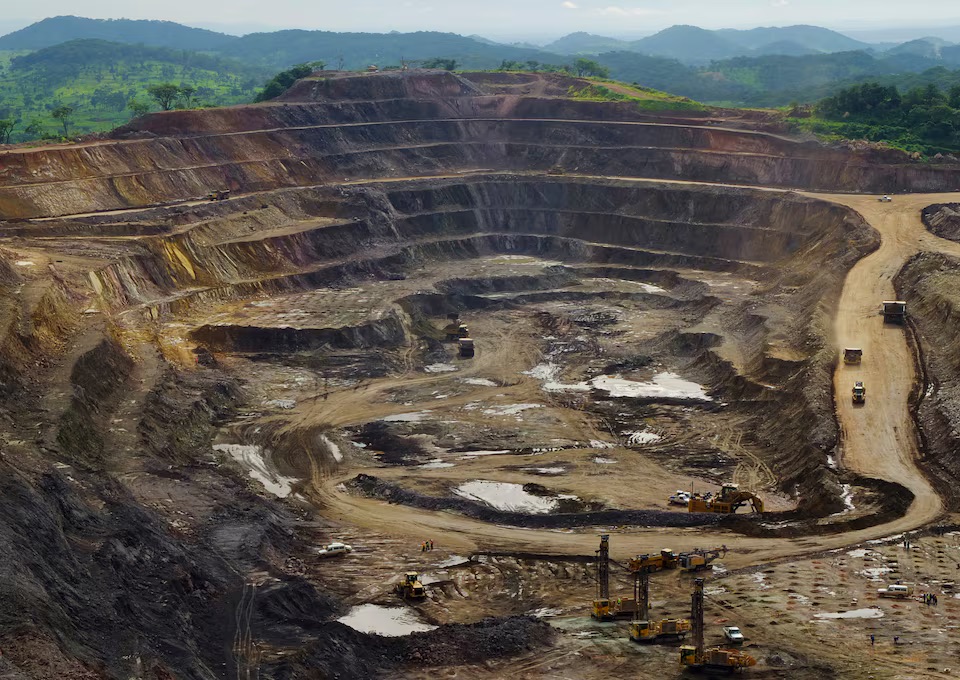Fortescue has dealt with this problem by developing motors that harvest energy during the descent, then release the charge when trains make their way back up to the mine.
“I think sometimes people misunderstand what we really are pulling off here, and that’s why so many people just doubt that we’re actually doing it,” says Otranto. “Well, I open the door to competition, suppliers: I want them to see that it is possible. This is the right thing to do.”
The deal is set to reduce the mine’s carbon emissions by around 78,750 tonnes per year. “Where this project is exceptionally exciting is that this is a baseload renewable energy solution,” says Matthew Tilleard, managing partner at CrossBoundary Energy. The baseload characteristic is achieved by building a system that he concedes is “in some ways massively oversized”.
Indeed, it is the economics of off-grid renewable energy that make these systems attractive to mining companies. “You don’t have to believe in climate change,” says Tilleard. “This is cheaper.”
Technology is also advancing around mining trucks. There are around 28,000 of these gargantuan and highly specialised vehicles operating around the world, emitting around 69 million tonnes of CO2 equivalent.
The International Council on Mining and Metals, the industry organisation that represents 24 of the world’s largest mining companies, is running an initiative to find ways to reduce emissions from trucks. Mining companies are partnering with equipment manufacturers such as Caterpillar, Komatsu and Sandvik in the initiative.
“Since we started that programme in 2018, we have seen significant progress,” says Bryony Clear Hill, the ICMM’s director of innovation. “We’re now estimating that we’ll have zero-emission vehicles at scale by 2030, which is a full 10 years ahead of the best estimates when we started the programme.”
Despite the visible progress being made around the world, the pace of decarbonisation is highly uneven across the industry. This is partly because every mine site is different: the feasibility of installing zero-emissions solutions such as solar or wind power depends on highly localised conditions, as well as the availability of land.
“There’s this broader ecosystem of enablers that needs to be in place to support mining, to be able to reduce at scale, at pace, so that we can be able to supply those critical minerals,” says Hayley Zipp, director of the environment programme at the ICCM.
“If you’ve got weak access to power-purchasing agreements and independent power producers, that’s really going to slow you down.”
Gregoire Bellois is a senior policy advisor at the Intergovernmental Forum on Mining, Minerals, Metals and Sustainable Development. He says that mining companies display varying levels of commitment around decarbonisation. Some larger companies are making “real progress”, he says. Others achieve decarbonisation only “on paper”, simply by divesting their highest-emitting mines.
Most Chinese companies are “really, very early in this process”, Bellois adds. Chinese firms are increasingly dominant in certain strategic mineral supply chains; Benchmark Mineral Intelligence estimates that Chinese companies will control 46% of the world’s cobalt supply by 2030. Though Bellois says some have shown interest in reducing their carbon footprint, “currently, they don’t see why they should do it. They have no requirement to do it. So, they don’t do it.”
One development that could have worldwide effects is the European Union’s proposed Carbon Border Adjustment Mechanism. If implemented, CBAM would impose a levy on carbon-intensive companies that export into the EU market. “In theory, it’s a really good tool,” says Bellois. But he warns there could be “perverse effects”, in that many producers will effectively be excluded from the European market, and will instead simply redirect exports towards customers in China.
While Bellois believes some mining companies can decarbonise, he is sceptical that the entire industry can make it even to “net” zero by 2050, let alone the “real” zero championed by Fortescue. Yet, given the significant acceleration in the production of many types of minerals, action is vital.
“We expect to mine in the next 30 years more than what we mined over the whole history of humanity,” says Bellois. “Every effort to try to limit the amount of what is emitted would be a net win.”

